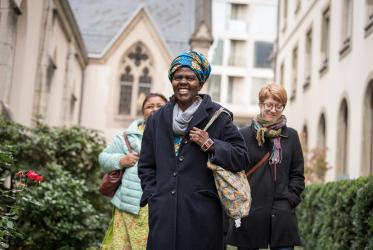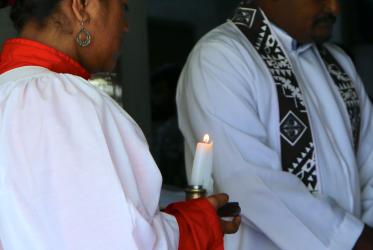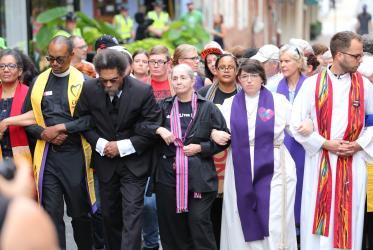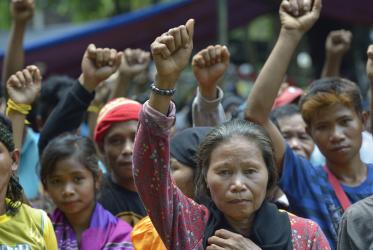Statement by the WCC Central Committee, Geneva, 15-22 February, 2005
1. Introduction
The pursuit of justice, peace and reconciliation has been at the core of the mission
of Christian churches as a response to the teaching of Jesus in the Sermon on
the Mount: "Blessed are those who hunger and thirst for righteousness, for they
will be filled
Blessed are the peacemakers, for they will be called the children
of God (Matthew 5: 6-9).
In everyday life and at the international level, Christians and churches all over
the world have made the search for justice and peace a central element of their
Christian commitment and the WCC has on several occasions highlighted the
importance of international law to build a more just world.
2. Importance of the International Criminal Court
The establishment of the International Criminal Court (ICC) is one of the most
important steps forward in International Law in the last decades. The Court provides
the international community with an instrument to defend human rights
and pursue justice, for specified crimes that otherwise would be committed with
impunity. The action of the ICC is an important step in the process of building
reconciliation within and among nations and communities.
Entered into force in July 2002, the ICC, according to the Rome Statute on which
the Court is based, will try individuals within its jurisdiction, which is limited
to the following crimes:
the crime of genocide, i.e. the intention to destroy, in whole or in part a national,
ethnical, racial or religious group;
crimes against humanity, including murder, extermination, deportation,
imprisonment in violation of fundamental rules, torture, rape and sexual
enslavement, enforced disappearance;
war crimes, including grave breaches of the Geneva Convention and other
serious violations of the laws and customs applicable in international armed
conflict, especially those addressed to the civilian population;
the crime of aggression (once a provision is adopted by the states party to it).
Human history is filled with examples of horrendous cruelties, aggressions and
inhumanities. In just the 20th century there are four recognized genocides - 90
years ago the Armenian genocide, 60 years ago the Holocaust, nearly 30 years ago
the Khmer Rouge and the most recent genocide in Rwanda, a little more than
10 years ago. There were very different ways of addressing these horrific crimes:
there was almost no consequence for the Armenian genocide, the victors' justice
in the Nuremberg trail for the Nazi war criminals, a failed local response with
UN support to the Khmer Rouge and the ad-hoc International Criminal Tribunal
for Rwanda.
In accordance with principles of criminal jurisprudence, ICC cannot exercise jurisdiction
retroactively to take legal action against the perpetrators of the unpunished
genocides of the 20th century. However ICC will provide a permanent tribunal
to deal with such future crimes in a coherent way, pursuing justice and
reconciliation and thus addressing issues such as impunity and accountability.
The world is presently experiencing many violent conflicts in different regions
and many states have been caught in the cycles of violence and revenge. Prosecuting
individuals for atrocities committed will contribute to the process of achieving
justice for the victims, the perpetrators and for society as a whole. It will also help
create respect for the rule of law, establish an accurate historical record and act as
a deterrent to future criminals.
While the ICC will not be able to prevent all future human rights violations, it will
provide a forum to prosecute the most heinous international crimes when national
systems are unable or unwilling to do so. It will offer redress to victims where national
courts are not in a position to deliver justice. It will also strengthen the possibility
for peace and end the cycle of violence, by offering justice as an alternative to
revenge. Finally it will contribute to the process of reconciliation by replacing the
stigma of collective guilt with the catharsis of individual accountability.
The Rome Statute for the ICC has been ratified by 97 states up to now. A global
Coalition for the ICC has been created to work towards more ratifications all
over the world. Special work is being carried out in the United States, which after
having signed the Rome Statute, has declared its intention not to ratify it and is
actively seeking bilateral agreements in order to exempt US nationals from prosecution
by the ICC in an inexcusable attempt to gain impunity from the crimes
defined in the Statute.
The Churches and the ICC
"You shall not render an unjust judgement;
you shall not be partial to the poor or defer to the great:
with justice you shall judge your neighbour." (Leviticus 19:15)
Churches have welcomed the establishment of the ICC and some have urged theirgovernments to sign and ratify the Rome Statute. The churches recognize thatthe ICC provides accountability to individuals who otherwise would escape fromthe jurisdiction of national systems of criminal justice.The WCC Assembly at Harare in 1998 in its statement on human rights welcomedthe agreement to create the ICC, and the Moderator's report acknowledged theestablishment of the ICC as a mechanism that should help the UN to enforce humanrights. It encouraged the WCC to cooperate with churches and other partners todeal with situations and cases where impunity generates injustice and violence.The churches in different parts of the world, and especially in those countrieswhich have suffered recently gross human rights violations, have been strugglingagainst impunity at the national and at the international level. The rationale ofthis struggle has been not so much to seek punishment, but to overcome violenceand impunity, to support victims and to pursue peace, justice and reconciliation.In this work, the paradigm of restorative justice has emerged as a way to stressthe importance of restoring broken relationships within the communities. Throughrestorative justice, people begin to understand each other's vulnerability andacknowledge their humanity. Restorative justice means to restore victims, restoreperpetrators and restore communities. A victim-centred approach emerges as oneof the characteristics of restorative justice procedures from the community levelto the national level. The ICC, through the importance given to the participationof victims in its structure and proceedings, brings this dimension to the internationallevel in a new way.Churches and ecumenical organizations have interpreted the cries of the victimsas a demand to respect their rights. The ICC responds to victims' rights to truth,justice and reparation. Victims have the right to know exactly what happened inthe case of grave human rights violations. Victims have the right to a just procedure.Victims have the right to compensation, restitution and rehabilitationbecause of the harm they have suffered. While the key role of the victims in theICC is highlighted in the establishment of the "Victims and Witnesses Unit"under the Registry and the "Victims Participation and Reparations Section", thecreation of the Trust Fund specifically addresses the reparation of victims of crimeswithin the jurisdiction of the Court.The Central Committee of the WCC, meeting in Geneva, 15-22 February, 2005,therefore:Reaffirms the importance of international law and international instruments toaddress the challenges of today's world in the current process of globalization;Reiterates its appreciation for the creation of the ICC as a permanent instrumentto provide accountability for specified crimes in the process of overcoming impunityand pursuing justice;Recalls the commitment of the churches in the Decade to Overcome Violence - Churchesseeking reconciliation and peace, following the biblical teaching "Seek peace and pursueit" (Psalm 34:14);Welcomes and endorses the establishment of the ICC as an adequate tool that willcontribute to peace-building with justice;Encourages the ICC - Judges, Prosecutor, Registrar and Staff - to follow strictlythe procedures established in the Rome Statute in order to fulfill its role ofachieving justice in cases brought before it and reminds the need for havinggender and regional representation in all positions according to the RomeStatute;Especially highlights the importance of the victims' participation as laid downin the procedures and the creation of the Trust Fund of the ICC to compensatevictims and relatives of victims of crimes under the jurisdiction of the Court;Commends the unprecedented acknowledgement by the ICC of women's humanrights and gender-specific rights abuses as crimes against humanity and war crimes,which enables recourse for women victims;Asks all governments which have not yet ratified the Rome Statute for the ICC,and especially the United States, to ratify it promptly without reservations givingthe Court as wide a jurisdiction as the Treaty permits over human rights andhumanitarian law violations to ensure political balance;Expresses its recognition to the governments which have ratified the Rome Statuteof the ICC, and asks them to adapt their national legislation to implement theICC and effectively support any process under the ICC jurisdiction;Calls upon WCC member churches to: urge the universal ratification of the Rome Statute of the ICC, particularlyin those countries which have yet to ratify the Rome Statute; cooperate actively with the ICC in those countries where procedures havealready started; develop training activities to deepen the knowledge of the relevance of thework of the ICC; support Christian, ecumenical and inter-religious initiatives which specificallyaddress the work of the ICC, like the Faith and Ethics Network forthe ICC and the Centre for Justice and Reconciliation in The Hague; join, in their own countries and regions, other civil society initiatives, likethe Coalition for the International Criminal Court, to support the work ofthe ICC; continue to pray for a just and peaceful world.




